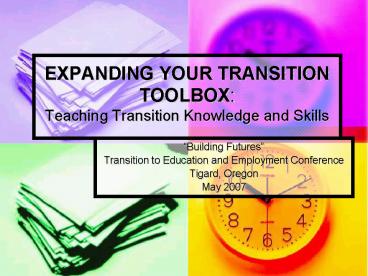EXPANDING YOUR TRANSITION TOOLBOX: Teaching Transition Knowledge and Skills - PowerPoint PPT Presentation
1 / 13
Title:
EXPANDING YOUR TRANSITION TOOLBOX: Teaching Transition Knowledge and Skills
Description:
EXPANDING YOUR TRANSITION TOOLBOX: Teaching Transition Knowledge and Skills 'Building Futures' ... Transition Seminars. Community College Tours. Industry Tours ... – PowerPoint PPT presentation
Number of Views:41
Avg rating:3.0/5.0
Title: EXPANDING YOUR TRANSITION TOOLBOX: Teaching Transition Knowledge and Skills
1
EXPANDING YOUR TRANSITION TOOLBOXTeaching
Transition Knowledge and Skills
- Building Futures
- Transition to Education and Employment Conference
- Tigard, Oregon
- May 2007
2
THE REALLY BIG IDEA
- Commit to what students need to know, be, and
do in order to successfully transition from
High School? - Commit to a method of learning about what
students KNOW and DONT KNOW about transition. - When you know what a student knows and doesnt
know, decide what to teach, how to teach it,
where to teach it, and when to teach it. - Choose methods to be individualized, accountable
and track progress.
3
Know, Be, and Do?
- IDEA defines transition as a coordinated set of
activities that promotes movement from school to
post-school activities. - Transition skills typically fall under domains
such as Employment, Independent Living,
Community Participation, Postsecondary Education. - Every student is different with some needing LOTS
of teaching and learning while others need only
to be pointed in the right direction. - For those needing LOTS of teaching and learning,
the next 2 slides illustrate
4
LEARNING TO WORK
5
LEARNING TO LEARN
6
Know, Be, and Do Part 2?
- Other ways of assessing
- http//www.caseylifeskills.org/
- http//www.proedinc.com/store/index.php?modeprodu
ct_detailid9009 - http//spot.pcc.edu/rjacobs/career/new_page_2.htm
- http//www.proedinc.com/store/index.php?modeprodu
ct_detailid6805 - How and Where do students learn to know, be, or
do? - In 11 interventions
- In small groups
- Where every other student learns
- Where is the best place?
- Can the assessment process help you figure that
out?
7
TRANSITION WHOS JOB IS IT?
The Way We Were
- Transition Interviews
- Agency Support
- Structured Work Experience
- Community Participation
- Transition Tutoring
- Future Visions
- School-based bus.
- Work Crew
- Career Fair
- Ethics in the Workplace
- Soph Symposium
8
TRANSITION WHOS JOB IS IT?
The Way We Were
The Way We Are
- Transition Assessment
- IEP Support
- Exit Interview
11
- Study Skills/Transition Classes
- Transition Seminars
- Community College Tours
- Industry Tours
- Work Crew
- School-based businesses
11
TARGETED GROUP
- Career Fair
- Ethics in the Workplace
- Sophomore Symposium
- Career-Related Learning
- Career Center Activities
TARGETED GROUP
UNIVERSAL
UNIVERSAL
9
More on HOW?
- Every student has to meet Career Related Learning
Standards. What are they? - http//web1.ode.state.or.us/search/page/?id1110
- Schools will have to link students to
opportunities to learn and apply this knowledge.
Collaborate and participate! - My students need 11 or small group specially
designed instruction. What curriculum is
available? - http//www.stanfield.com/sch2wk.html
- http//www.proedinc.com/store/index.php?modeprodu
cts_searchsearchtypebroadcategory5B5D44type
5B5D1type5B5D3x22y15 - http//www.caseylifeskills.org/pages/res/res_ACLSA
Guidebook.htm - http//www.ncset.org/publications/mfmp.asp
- http//www.uncc.edu/sdsp/curriculum_components.pdf
10
How to Individualize and be Accountable
- Present Level of Performance Example
- Following administration of a Transition Skills
Survey in the area of Learning to Work, three (3)
areas emerged as priorities for Angela. These
areas are items in which she scored as Not Like
Me (vs. Somewhat Like Me and Very Much Like
Me) and indicated in a follow-up interview, that
she was interested in gaining skill or being
involved in activities to make progress in these
areas having to do with Learning to Work. Angela
indicated that she (1.) does not know how to
match her strengths and interests to a career
that may interest her. Her diagnosis of Attention
Deficit contributes to her struggle with
sequencing information so it ends up making sense
and being relevant to her. Angela also identified
that she (2.) cannot describe how her disability
might affect job performance. Another area of
need for Angela is (3.) being able to name things
to do to be a more responsible worker. Because
she can be impulsive, Angela has lower
evaluations in her in-building Work Experience.
Angela is interested in attending community
college after she graduates and would prefer to
be a Vet Tech or a Certified Nurses Assistant. If
she can handle the academic demands, she might
like to pursue becoming a Licensed Practical
Nurse.
11
Getting it into the PLAN!
- One of Angelas IEP goals could be
- Angela will successfully identifies 3 personal
interests, 3 strengths and 2 weaknesses that
might impact her ability to work in a health
related occupation - AND/OR
- Angela will list (in writing or verbally) 3 ways
that her disability will challenge her on a job
and 3 ways that her disability may be of benefit. - OR WHAT IF ANGELA HAD MORE SIGNIFICANT
DISABILITIES? - Using picture cues, Angela will follow 4-5 step
instructions by the end of the year utilizing the
system independently 90 of the time as evaluated
by a work experience supervisor, staff, or
employer.
12
SO WHAT?
- What did that previous slide have to do with
anything? - Assessment will reveal things that need to be
learned. - Things that need to be learned end up in the
PLAN! - If its in the PLAN, then someone has to figure
out what to teach, how to teach it, where it will
be taught, and when it will be taught. - What, How, Where, and When are simply tools.
- The critical commitment is to value the teaching
of transition knowledge and skills as a starting
point.
13
For More InformationContact
- Peter FitzGerald
- Youth Transition Program
- Technical Assistance Provider
- (503) 522-6973
- petefitz_at_qwest.net
- OR
- Mike Johnson
- Youth Transition Program
- Technical Assistance Provider
- (541) 346-1412
- dudley_at_uoregon.edu































